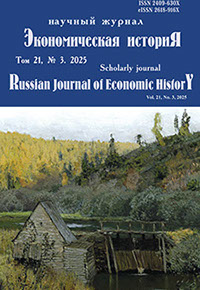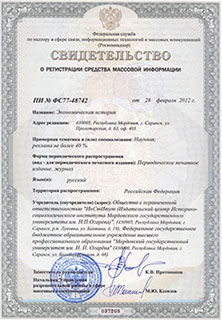Экономическая историЯ
Russian Journal of Economic History
ISSN 2409-630X (Print)
ISSN 2618-916X (Online)
Expert board:
- Scientific Council of RAS on economic history;
- Research and Educational Center «The economic history of Central Russia and the Middle Volga region» of Ogarev Mordovia State University;
- Center of Economic History of Lomonosov Moscow State University
Navigation
ISSN 2409-630X (Print), ISSN 2618-916X (Online)
DOI: 10.24412/2409-630X.070.021.202503.302-312
Lidia M. Kolbina1, Anastasia S. Osokina2
1, 2 Udmurt FRC UB RAS (Izhevsk, Russia)
1 e-mail: lidakolbina@yandex.ru
2 e-mail: Anastasia.osokina2017@yandex.ru
The crisis of public beekeeping in the period from 1982–1991 in collective farm “Russia” Mozhginsky district of the Udmurtia ASSR
Abstract
Introduction. The economic and political situation at the end of the 20th century had a serious impact on all areas of the country’s economy, including agriculture. In many areas of intensive agriculture, due to the lack of bees, crops were not provided with optimal bee pollination. The material and technical base of public apiaries was poorly developed, there were not enough premises, the level of mechanization of production processes was low, as well as a lack of qualified personnel, and young workers were not gaining a foothold in this industry. New types of economic relations were emerging on collective farms: rent, contract. Beekeeping became unprofitable in the collective farm format, and the form of private keeping of apiaries became very popular. Using the example of the large-scale farm “Russia” in the Udmurt Republic, the development trends and the main problems of collective farm apiaries in the period 1982–1991 are considered. The purpose is a retrospective analysis of the state of beekeeping in the Udmurt Autonomous Soviet Socialist Republic using the example of the “Rossia” collective farm during the crisis, to identify weaknesses to prevent such situations.
Materials and Methods. According to archival documents of the large collective farm “Russia” (reports), reviews of agrometeorological conditions of the Udmurt Autonomous Republic, Central State Archive of the Udmurt Republic (CSA UR) R-567 Ministry of Agriculture and Food of the Udmurt Republic, R-1263 State Unitary Enterprise of the Udmurt Republic “Beekeeping of Udmurtia”, R-1650 Udmurt Hydrometeorological Observatory of the Upper Volga Territorial Departments for Hydrometeorology and Environmental Control and its predecessors.
Discussion and Conclusion. The weather conditions of those years in terms of average temperature values show significant differences from month to month from year to year. Significant cold snap affected the yield of bee products in some years (1985, 1986, 1991). Since 1987, the acreage of perennial grasses has decreased by 27,5 %, the acreage of legumes has decreased by 2,2 times, and flax by 3,3 times. Buckwheat stopped being sown due to crop instability. Buckwheat began to be replaced by millet, which yields a less valuable grain, but has a more stable harvest. Analyzing the farm data in dynamics over the years, the number of bee colonies for the period under review is duplicated with the situation in the republic. For example, in 1983, there were 365 collective farms and state farms in the republic, of which 175 farms were engaged in beekeeping and 22 287 bee colonies were maintained. In comparison with 1982, there has been a decrease of 3,733 bee colonies. Such a large reduction in bee colonies occurred due to unfavorable weather conditions that developed during the formation of swarming and flowering honeybees.
Keywords: beekeeping, weather conditions, acreage, honey productivity, wax productivity, bee diseases.
For citation: Kolbina L. M., Osokina A. S. The crisis of public beekeeping in the period from 1982–1991 in collective farm “Russia” Mozhginsky district of the Udmurtia ASSR. Ekonomicheskaya istoriya = Russian Journal of Economic History. 2025; 21(3): 302–312. (In Russ.). DOI: 10.24412/2409-630X.070.021.202503.302-312.
Acknowledgements: The study was carried out with the financial support of the Udmurt Research Institute of the Ural Branch of the Russian Academy of Sciences (state assignment No НИР FUUE 0001).
© Ogarev Mordovia State University. History and Sociology Institute, 2017
68, Of. 411, Bolshevistskaya St., 430005, The editorial office of the scholarly journal «Russian Journal of Economic History»
Tel.: (8342) 24-25-90; 27-07-11, Fax: (8342) 24-25-90, E-mail: jurnal-econom-hist@isi.mrsu.ru
Designed by A. Napalkov, Email: napalkov@isi.mrsu.ru


